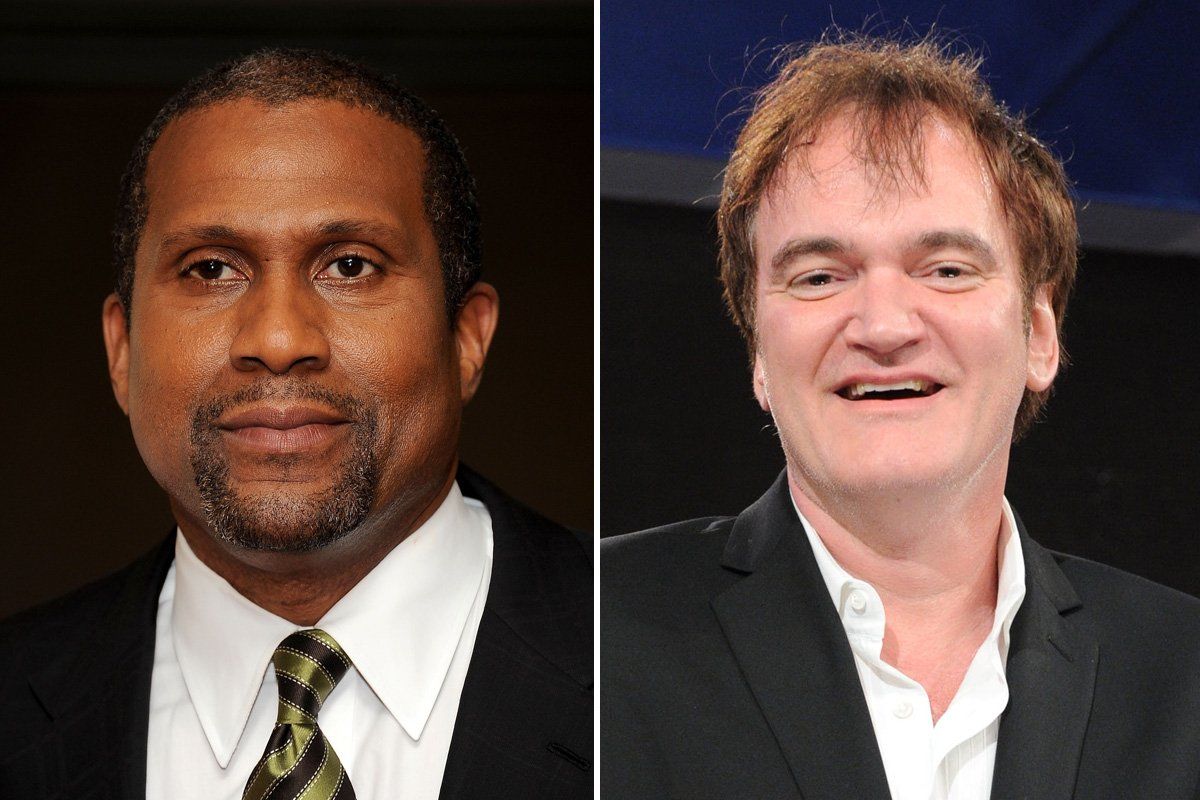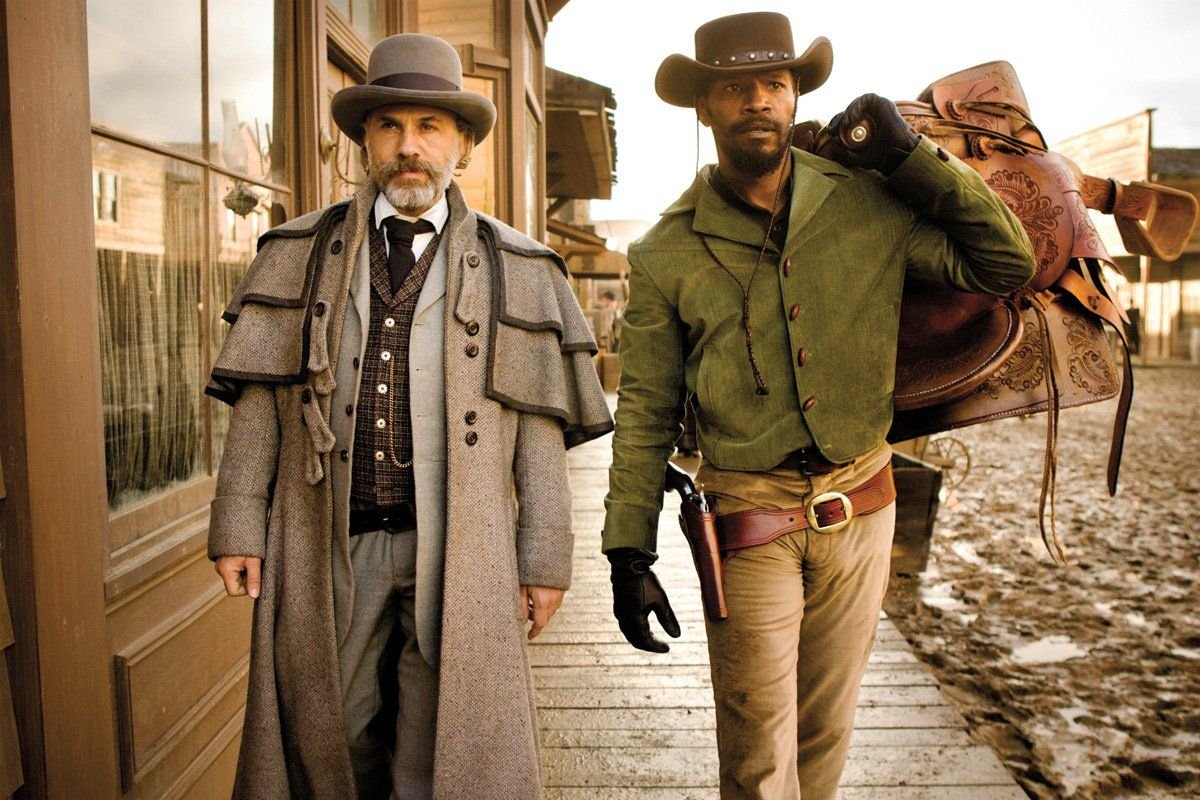
The author and host of the Tavis Smiley show discusses filmmaker Quentin Tarantino's treatment of black culture in the new Western Django Unchained and asks why Hollywood can't get it right on the legacy of slavery.
I'm interested to hear your thoughts on Django Unchained. What was your initial reaction to the film?
I refuse to see it. I'm not going to pay to see it. But I've read the screenplay, and I have 25 family members and friends who have seen it, and have had thousands of conversations about this movie, so I can tell you frame by frame what happens. I'm troubled that Hollywood won't get serious about making an authentic film about the holocaust of slavery but they will greenlight a spoof about slavery, and it's as if this spoof about slavery somehow makes slavery a bit easier to swallow. The suffering of black people is not reducible to revenge and retribution. The black tradition has taught the nation what it means to love. Put it another way: black people have learned to love America in spite of, not because of, so if the justification for the film in the end is, as Jamie Foxx's Django says, "What, kill white people and get paid for it? What's wrong with that?" well again, black suffering is not reducible to revenge and retribution.
Tarantino even went on the record saying Roots was inauthentic. First of all, Tarantino is not a historian. When people see his film who don't have any understanding of history, they take it as history, because Tarantino passes himself off as a historian by declaring Roots inauthentic, and then goes on to make the "authentic" story about slavery. It doesn't tell the truth about what the black contribution to this country has been. Tarantino has the right to make whatever films he wants to make. What he's not entitled to is his own set of facts and to lecture black people about the inauthenticity of an iconic, game-changing series like Roots. I don't take kindly to white folk like Tarantino lecturing black folk about their history. That's just unacceptable. Tarantino is absolutely exhausting.
What do you find so exhausting about Tarantino, and in particular, his film's relationships with black culture? Spike Lee has had issues with Tarantino's usage of the N word in the past, and he also came out and said this film was "an insult to his ancestors."
To my mind, there's clearly a level of arrogance with what Tarantino does, and what he thinks he can get away with. I don't always agree with Spike Lee on everything, but he's absolutely right on this. I can't imagine any other culture that would allow someone to so recklessly use the word "n----r" in film after film after film. It's not even like he did it one time. There's a level of comfort that Tarantino has with appropriating and reimagining black culture and black history, and that's what I find offensive.
Are you trying to say that you find Tarantino's oeuvre racist?
I'm always leery to call people racist because I don't ultimately know what's inside their heart. I don't know what's inside Tarantino's heart; what I do know is what's inside his head, because that's what we see on film. If what's inside his head is connected to what's inside his heart, then this brother needs some help. And black folk are going to have to make some choices and some decisions about whether we continue to aid and abet Hollywood in the raping of our history.
Why hasn't someone like Lee taken on the subject of slavery? It always seems to be white filmmakers like Tarantino, Steven Spielberg, Ed Zwick (Glory), etc.
It's a great question. John Singleton did a movie called Rosewood and it tanked. When Spike did Malcolm X, he had to go around and get wealthy black celebrities—Bill Cosby, Oprah, others—to invest in the film. Hollywood wouldn't give him the resources. He put his neck out there. Then he cast Denzel Washington, who did a brilliant job as Malcolm X, and he got robbed of an Oscar. There's a history here of black people trying to tell the story, and when they try to tell the story, Hollywood doesn't support their telling of the story, and when the story is told, they get robbed of Oscars!
Henry Louis Gates recently did a series of interviews with Tarantino on Django Unchained, and he didn't really take him to task on any of these points.
That's what I mean by the complicity of black media and black scholars. There's no way that Skip Gates should have talked to Tarantino without checking him on calling Roots inauthentic. Skip should've blasted him on that, period. This is how you take the teeth out of the truth. Django isn't the only thing that's unchained in Hollywood. We are becoming more and more untethered from the truth ... and if you can make that torment more and more palatable by putting the right soundtrack around it, by casting the right actors, by throwing in a few jokes here and there, you can make slavery easier to swallow, and you can sell it. But it completely distorts the truth about our history. The ultimate question in my mind is, is nothing sacred? This is the problem with Hollywood—there are few things left that are sacred, and slavery, just like the Holocaust, should be one of those things that is sacred.

What about Spielberg's filmLincoln, also in theaters?
It's a wonderful film, but it puts forth the proposition that Abraham Lincoln was always on the right side of the slavery question, and he wasn't. And there is not even a passing reference to Frederick Douglass in the film. Anyone who knows history knows it was Douglass talking to Lincoln repeatedly that helped get Lincoln on the right side of the slavery question and stiffen Lincoln's spine. So when people see these films, they take it as history.
Have any films come close to capturing the "authentic" slavery narrative?
Amistad was a good effort on the part of Spielberg. But I think [screenwriter] Tony Kushner missed the mark on Lincoln with regard to this particular issue. I saw him on Bill Moyers the other night, and he said that Lincoln didn't have any black friends; that Lincoln didn't know any black people. I can't believe no one is taking him to task for this. I almost fell out of my seat! I was waiting for Moyers to say, "What about Frederick Douglass?"
What role does Hollywood play here?
The greater problem with Hollywood is that there's no balance. One might have a stronger stomach for a movie like Django if there was a library of films I could go to that tells the authentic story of slavery and segregation. But since that library doesn't exist, since there's no balance in Hollywood when it comes to the complexities of black life in America, then it makes it harder to stomach a spoof. There are all kinds of questions being raised on the Internet about whether Tarantino would do a spoof about the Holocaust. It raises countercharges of being anti-Semitic, but it's not. It raises an important question about what Hollywood would greenlight and not greenlight.
Some of this is the responsibility of Hollywood and some of it is the complicity ... of black producers, black actors, black media, and black consumers. When Amistad came out, black people did not support that film the way we should have, but we'll run out on Christmas Day and spend $15 million to see Django. So some of it is about what Hollywood gives us, and some of it is about what we're willing to accept from Hollywood.
Are you saying it's the responsibility of actors like Foxx to be arbiters of taste?
I gave up long ago on expecting these contemporary actors to make tough choices and right decisions consistently. There are those who do, but the reality is there's always somebody in Hollywood who would take the role because there are people who don't know their history, don't care about their history, or frankly, just want work. I'm always sympathetic to the black actor's predicament in Hollywood given the scarcity of roles, but again, it's the trifecta at work here: the black actor, Hollywood, and the stuff they'll produce—they have no problem producing Madea and the Tyler Perry films—and the third prong is black consumers. If black people had boycotted Django Unchained on Christmas Day, incensed, they wouldn't have tried that again. I like Harvey Weinstein. I've had him on my show a number of times, and he's produced a number of films that are among the best of the generation's. But he missed the mark here.
Any final thoughts on Django?
Every black person I've spoken to, who has seen the film, has had some level of discomfort seeing it—but they all justify it by saying, "Well, at least we win in the end." It's the revenge and retribution that black folk are using to justify seeing the film, or what Tarantino has done, and that's absolutely not the story of the black contribution to the nation. Our contribution to the nation is that we didn't create a black al Qaeda. Look at all that black people have endured and gone through, and then look at the patriots that we have become. That's the beauty of the black experience. Look at the humanity at the epicenter of the story. Django is not about humanity or love. It's about revenge and retribution, and it's wrong when black people justify a film by that standard. I'm concerned about generations of black and white kids yet unborn because this is a very slippery slope. When you give Hollywood license to rewrite your history, your culture is in trouble.
On a closing note, I heard you're going to circulate a national petition on poverty. Tell me about the new project.
It ought to be clear to all of us that the gap between the rich and the poor in this country continues to widen, and these fiscal-cliff negotiations we're having right now, this budget is going to be balanced on the backs of the poor. Poverty is threatening our democracy and is now a matter of national security. This petition, and the corresponding symposium we're having on Jan. 17 in Washington, is designed to make the president make poverty a priority in his second term. He needs to do that if he wants to have a legacy for which he can be proud.
Uncommon Knowledge
Newsweek is committed to challenging conventional wisdom and finding connections in the search for common ground.
Newsweek is committed to challenging conventional wisdom and finding connections in the search for common ground.
About the writer
To read how Newsweek uses AI as a newsroom tool, Click here.








